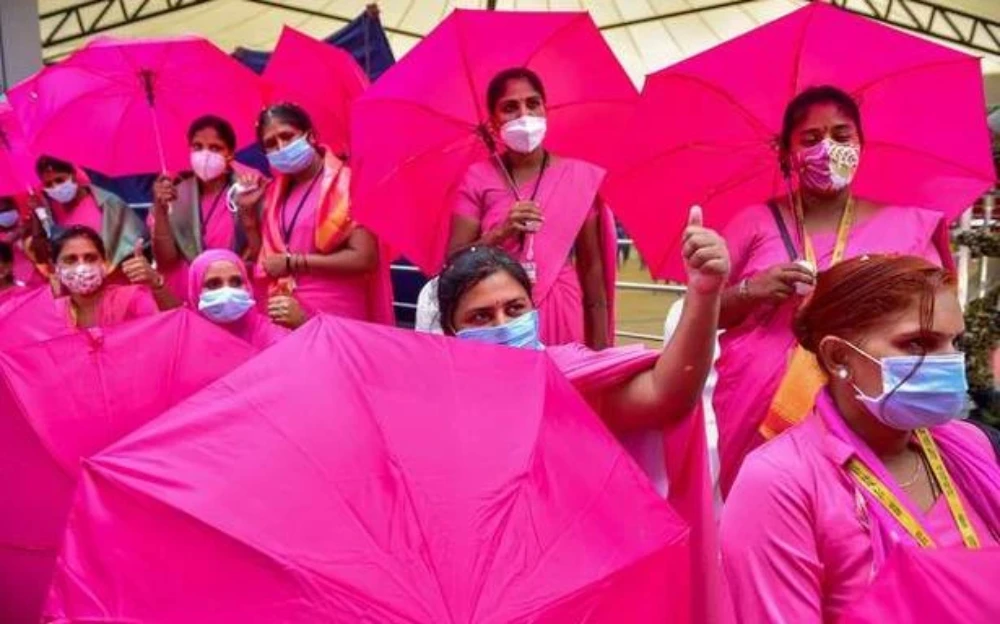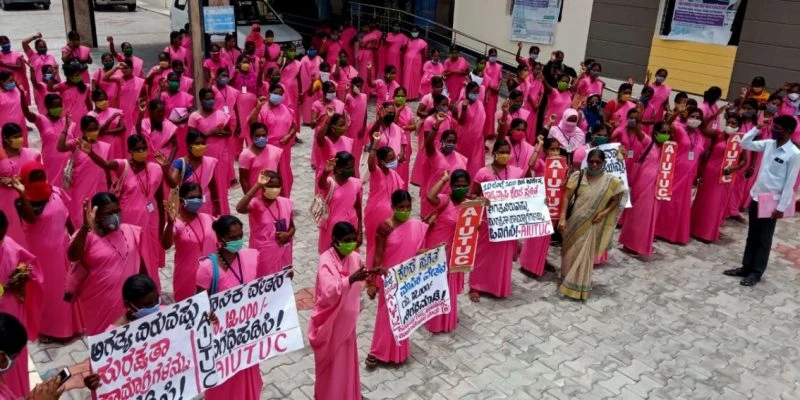By: Samyuktha Sethuraman
While India is scrambling its way out of the covid-19 pandemic these past few months, a “force” has come to the limelight of Indian citizens in a form of “Women in Pink”. A national daily expresses in their article that these daring women actually became the fronliners in Indian communities in the face of the pandemic and that they are called ASHA (Accredited Social Health Activists) Workers.
I was instantaneously curious to know more about them. Luckily, I got the chance to personally interview one of them, Surekha. She told me in-detail describing what the ASHA workers do, painting a vivid picture of the pros and cons of it.
From the voice of a warrior – Surekha
Surekha hails from the city Calicut, Kerala. Her family consists of her husband and her two children. She was made familiar to the organization when her husband’s friend had told her that there was a vacancy to be filled with ASHA and without any hesitation, she leaped right at the golden ticket that was brought to her.
On a regular basis, ASHA Workers job is to ensure the health of pregnant women in the communities by giving proper vitamins and talking about health information. They also spread awareness like immunization for children, doing village sanitation, family planning trainings, and conducting first aid. But then, their primary duty changed when the first case of the corona virus was detected.
For Surekha, she was initiated into the job in the month of April, 2020. Owing to the pandemic, she could not attend the mandatory skill training sessions. Nevertheless, she surely is equipped with the vital skills that has gone a long way while the outbreak of the virus chanced in her community.

After an initial chit-chat, I plunge into the questions that I wanted to ask her ever since I recently read an article in a newspaper about these valiant women.
SS: So amidst the pandemic, what are the roles and duties you have been assigned? How has the government supported you?
Surekha: In the current circumstance, apart from doing our regular duties, we bear the responsibility of going door-to-door on a daily basis to take surveys, to examine if anyone is symptomatic or asymptomatic. The community I live in consists of 500 people who are to be checked upon. But since I am the only ASHA worker in my community, I make sure to check upon each of them. I am associated with a Primary Health Centre (PHC) in my area and I receive daily instructions from a senior nurse. As for the support from the State government, we have received masks and gloves but not sanitizers. Additionally, more people need to be assigned in my area.
SS: How have the people in your community reacted during these trying times? What were some of the challenges you faced?”
Surekha: Well, a great majority of them have definitely cooperated with me. As for the challenges, there were people who haven’t been at their best cooperation. For instance, one of our chief tasks is to incessantly undertake surveys. Some of them don’t like us taking the surveys purely because they are restating what they would have said earlier. Moreover, they even ask us sometimes as to why we bother taking these surveys. Then there are those who are plainly afraid because we visit many houses. Due to their fear, they sometimes even omit giving us important details while undertaking the surveys.
SS: How about the people in quarantine?
Surekha: They cooperate well. Once we get the data from the airport authorities, our job is to go and check on the people who are in quarantine, either at their own homes or at a Government designated facility. She replies placidly.
SS: What is your approach towards this field of employment? Has this field always been your calling?
Surekha: I have a positive outlook towards this field because ultimately it is social service. I intend on continuing to work in this field due to my passion for it. There is something enigmatic about being a health worker. I personally receive a great degree of self-satisfaction from this occupation. I am able to nurture, support and care for those who need it during these gruelling times, especially for the elderly people.
SS: How has working amidst this critical time affected your personal-professional life equation?
Surekha: It has never disturbed my personal-professional life balance. Like I mentioned earlier, it is social service. Hence, I have the gratification that I have served my community alongside spending quality time with my family. The best part about my job is that I get to interact with many new faces especially with higher authorities which has made me a more confident individual, given the fact that I am an introvert.
SS: What are some of the steps you take on a personal level to be safe at all times?
Surekha: I make sure to sanitize myself thoroughly before and after meeting people amongst my community. That is the most basic thing I do at a personal level and so do the others. Since I have 2 young children, I am extra careful before stepping into my house.
SS: Haven’t you ever felt scared working during this time?”
Surekha: “Yes. I definitely have felt scared. But the spirit of volunteerism and service is what keeps me going, irrespective of everything else,” she boldly responds to my final question.
Surekha remains to be one of those thousands of workers having their lives at stake at each second of the day, each step of the way. They are the symbol of true service and selflessness. It is their hard-work that ensures we see the light at the end of the tunnel.

The Malicious Reality
Unfortunately, reality has been inconsiderate towards these brave-hearts as the government has not paid them for their services after the pandemic hit the country.
Before the pandemic, they received a minimum of INR 4000 (USD 53). Currently, they are being given only INR 1000 (USD 13).
ASHA Workers came together on July 20th 2020 to protest against the cruel injustice they have been facing. It has been 11 days since the country has witnessed their protests putting a halt to their work. Both Central and State Governments are yet to provide them with their due compensation.
Feasible solutions – May the Pink Force remain alive in India
As the Health Ministry is chiefly responsible for the ASHA Workers, the ministry must at all costs make an optimal usage of resources to ensure that the women at the forefront do not feel demotivated to draw back from the services they provide as the country need them now more than ever.
The healthcare system is fragile but the ASHA Workers have made a qualitative difference to its functioning. Hence, retraining and redefining what these women must do at this point becomes pivotal.
Virtual skill training sessions can be conducted in order to educate the women, to enhance their knowledge and skills better. This is the time in which the government must make the shrewd decision of investing in health infrastructure and health human resources without any hesitation.
The ASHA Workers are the writers of their own story. They surely have a turbulent road ahead of themselves and the story is yet to unfold. But in this critical times, their voices have to be clearly heard and their services must not go in vain.
References
I take this opportunity to thank my mother, Lakshmy and her colleague, Mr. Samjith Palat, who helped me connect with the ASHA Worker whom I was able to interview and get inspiration from.

